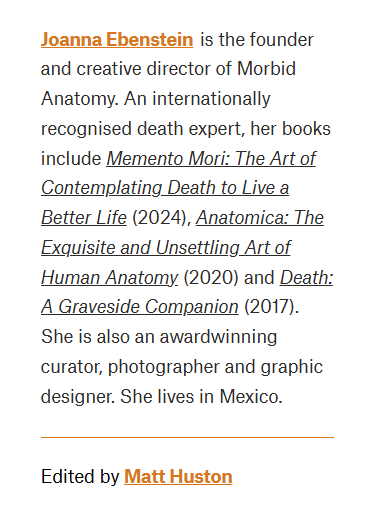Welcome to DU!
The truly grassroots left-of-center political community where regular people, not algorithms, drive the discussions and set the standards.
Join the community:
Create a free account
Support DU (and get rid of ads!):
Become a Star Member
Latest Breaking News
Editorials & Other Articles
General Discussion
The DU Lounge
All Forums
Issue Forums
Culture Forums
Alliance Forums
Region Forums
Support Forums
Help & Search
Reflections on mortality can help you live well now - here's how

For me and many others, contemplating death has clarified what matters. These curiosity-based exercises will get you started
https://psyche.co/ideas/reflections-on-mortality-can-help-you-live-well-now-heres-how

An ancient floor mosaic found in Antakya, Turkey. Loosely translated, the Greek text ‘Euphrosynos’ may mean ‘be cheerful, enjoy life’. Courtesy Antakya Archaeology Museum/Wikipedia

When I was an adolescent, I developed a profound fear of flying. But I also really loved to travel. To overcome this impasse, I developed a sort of spontaneous ritual. As soon as I got myself situated on the plane – carry-on stowed, seat belt buckled – I would close my eyes and take a few deep breaths. Then I would ask myself a question: ‘If I were to die today on this flight, what would I regret?’ Unwittingly, and knowing nothing of the tradition, I had developed my own memento mori.

A Woman Divided into Two, Representing Life and Death. Courtesy the Wellcome Collection, London
For millennia, and all over the world, people have actively cultivated a relationship with death as an important part of a life well lived. One way they have done so is through the use of memento mori (Latin for ‘remember you must die’). These are practices, objects or artworks created expressly to remind people of their death as a means of encouraging them to live the life they truly want before it’s too late. By forging a relationship with death, many people have found that they were, paradoxically, able to live fuller and more meaningful lives.
Steve Jobs, the man behind Apple computers and the iPhone, made use of memento mori in the crafting of a unique and impactful life. In a 2005 commencement speech – soon after he was diagnosed with a rare form of pancreatic cancer – Jobs shared that, since his teens, he would look in the mirror every morning and ask himself: ‘If today were the last day of my life, would I want to do what I am about to do today?’ If he found that the answer to that question was ‘No’ for too many days in a row, then he would make a change. He also told the young graduates:
What our ancestors knew so well – and Jobs and I both accidentally discovered – is that contemplating death is a powerful tool that, regardless of your beliefs about God or an afterlife, can transform your life. Its formidable lineage stretches back at least to Socrates, who asserted that the core of philosophy itself was a memento mori-like contemplation of one’s mortality. In ancient Rome, it was common to encounter a skeleton mosaic on a tavern floor as an exhortation to ‘seize the day’ (carpe diem); in other words, eat, drink and be merry, for tomorrow you might be dead. Christians used memento mori as a reminder to resist earthly temptations and to be ready to meet (and be judged by) their maker. Memento mori were also used by some Buddhists, who would visit charnel grounds and meditate on decomposing corpses as a means of overcoming fear of death. Even today, one sometimes finds a human skeleton in a Buddhist meditation space.
snip

Memento Mori, ‘To this Favour’ (1879) by William Michael Harnett. Courtesy the Cleveland Museum of Art

Detail from the mural Dream of a Sunday Afternoon in Alameda Park (1947) by Diego Rivera. Courtesy Adam Jones/Flickr
3 replies
 = new reply since forum marked as read
Highlight:
NoneDon't highlight anything
5 newestHighlight 5 most recent replies
= new reply since forum marked as read
Highlight:
NoneDon't highlight anything
5 newestHighlight 5 most recent replies
Reflections on mortality can help you live well now - here's how (Original Post)
Celerity
Mar 2025
OP
dalton99a
(89,608 posts)1. Kick
MineralMan
(149,566 posts)2. Good points. I'll be 80 in July.
I don't worry about dying. I've always known I wouldn't live forever. But, so far so good.
I've always lived my life knowing that it was a time-limited thing. So, I've acted on that basis.
No pie in the sky when you die in my reckoning. Live now. You're alive. You know you're alive. When you're not, you won't exist, so why worry about that.
Uncle Joe
(62,492 posts)3. When my grandfather was a young man, he dressed in his finest suit
and had my grandmother make a pic of him lying on the bed, with his hands crossed over his chest so that he could see what he would like at his funeral.
![]()
Thanks for the thread Celerity.
